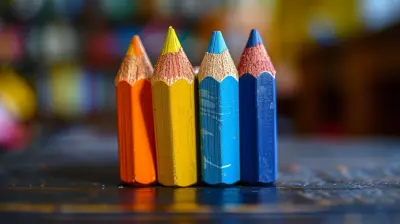The Role of Curiosity in Driving Inquiry-Based Learning Success"
20 April 2025
Ever wondered why toddlers ask a million questions a day? From “Why is the sky blue?” to “Do fish sleep?”—their curiosity is insatiable! And you know what? That same curiosity is the secret sauce behind successful learning at any age.
When it comes to education, inquiry-based learning (IBL) is all about harnessing this natural curiosity. It’s not about stuffing students’ brains with facts but helping them explore, question, and discover knowledge on their own. So, let’s dive into why curiosity is such a game-changer in inquiry-based learning and how it fuels student success. 
What is Inquiry-Based Learning, Anyway?
Before we get caught up in the curiosity craze, let’s break down what inquiry-based learning actually is. In simple words, it’s a teaching strategy that flips the traditional classroom approach on its head.Instead of spoon-feeding information, teachers encourage students to ask questions, investigate, and reach conclusions on their own. Think of it as less of a lecture and more of an educational treasure hunt—where students embark on a journey to uncover knowledge rather than passively absorb it.
The Key Elements of Inquiry-Based Learning
1. Questioning – Encouraging students to ask meaningful questions.2. Investigation – Researching, experimenting, and exploring concepts.
3. Collaboration – Sharing findings and working together.
4. Reflection – Assessing what they’ve learned and how they reached conclusions.
Now, here’s where curiosity comes into play. Without it, inquiry-based learning would be like a car without gas—completely useless. 
The Magic of Curiosity in Learning
Let’s be honest, we’ve all sat through dull lessons where information went in one ear and out the other. But when something genuinely sparks our interest? Boom! We’re googling it at midnight, watching documentaries, and dropping random facts into conversations like expert scholars.That’s the power of curiosity—it transforms learning from a chore into an adventure.
Why Curiosity is a Superpower in Education
1. It Makes Learning EnjoyableWhen students are genuinely curious, they don’t just memorize facts for a test—they crave answers. Learning becomes fun, and fun learning sticks!
2. It Encourages Critical Thinking
Curiosity isn’t just about asking what?—it’s about asking why? and how?. This deepens understanding and helps students become problem solvers rather than passive learners.
3. It Sparks Creativity
When students explore topics on their own, they think outside the box, generate new ideas, and connect concepts in unique ways.
4. It Builds Lifelong Learning Habits
A curious mindset doesn’t just help in school—it fuels personal and professional growth throughout life. Scientists, entrepreneurs, and innovators all have one thing in common: an insatiable curiosity. 
How Curiosity Drives Inquiry-Based Learning Success
Curiosity and inquiry-based learning are like peanut butter and jelly—they just belong together! Here’s how curiosity supercharges IBL and leads to student success.1. Students Take Ownership of Their Learning
Ever noticed how much effort people put into things they truly care about? Students who are curious take the reins of their learning journey. Instead of waiting for answers, they actively seek them out.A curious student in an IBL classroom isn’t asking, “Do we have to learn this?” Instead, they’re wondering, “What happens if we approach this problem differently?”
2. Curiosity Fuels Deeper Understanding
Memorizing facts can help you pass a test, but real understanding comes from digging deeper. When students follow their curiosity, they don’t just skim the surface—they dive headfirst into learning.For example, instead of merely learning that plants produce oxygen, a curious student might wonder: How do different plants produce varying levels of oxygen? This leads them down a rabbit hole of research, experimentation, and real-world connections.
3. It Turns Setbacks Into Opportunities
Curious students see mistakes as part of the learning process rather than something to be avoided. When they hit roadblocks, instead of giving up, they ask: “Why didn’t this work?” “What can I try next?”This fosters resilience, a growth mindset, and the ability to view challenges as opportunities for discovery rather than obstacles.
4. It Promotes Active Engagement
Let’s face it—students disengage because traditional learning can feel forced and unexciting. But give them something they’re curious about, and suddenly, they’re laser-focused.IBL thrives on this because the more engaged a student is, the more they participate, collaborate, and retain information.
5. Curiosity Bridges Subjects Together
Learning doesn’t happen in isolated bubbles. A curious student exploring history might stumble upon connections with science, literature, or even math. Inquiry-based learning nurtures this natural cross-disciplinary curiosity, making education more holistic and interconnected.
Fostering Curiosity in the Classroom
Great! We’ve established that curiosity is the secret ingredient to inquiry-based learning success. But how do we actually spark it in students? Here are some tried-and-tested strategies:1. Encourage Questions (Even the Weird Ones!)
Teachers should create an environment where questions—even the completely off-the-wall ones—are welcomed. A student curious about how astronauts go to the bathroom in space is already developing a scientific inquiry mindset!2. Move Beyond the Textbook
Textbooks are great, but they’re just one piece of the puzzle. Interactive activities, real-world applications, and hands-on experiments make learning feel more like an adventure than a chore.3. Let Students Lead the Way
Instead of dictating every step, let students explore topics that genuinely interest them. Passion projects, research-based assignments, and student-led discussions can nurture natural curiosity.4. Cultivate a Growth Mindset
Students should understand that not knowing something isn’t a failure—it’s an opportunity to investigate and learn. Encouraging a classroom culture that values curiosity over mere correctness can do wonders.5. Make Learning Relevant
Want students to care? Show them why what they’re learning matters. When students see connections between classroom topics and real-world problems, their curiosity skyrockets.Wrapping It Up
Curiosity isn’t just a nice-to-have in education—it’s a must-have. It’s the driving force that makes inquiry-based learning effective, engaging, and, most importantly, fun! When students are encouraged to ask questions, explore ideas, and seek answers, they don’t just learn—they love learning.So, whether you’re an educator, a student, or just someone who enjoys a good “why” question, always remember: curiosity is the fuel that powers discovery. Now go ahead—ask more questions, dig deeper, and never stop wondering.
all images in this post were generated using AI tools
Category:
Inquiry Based LearningAuthor:

Olivia Lewis
Discussion
rate this article
7 comments
Sierra Davis
Great article! Emphasizing curiosity as a catalyst for inquiry-based learning truly highlights its importance in fostering engagement and critical thinking. Encouraging students to ask questions can lead to deeper understanding and more meaningful educational experiences.
May 2, 2025 at 11:59 AM

Olivia Lewis
Thank you for your thoughtful comment! I'm glad you found the emphasis on curiosity impactful in promoting engagement and deeper understanding in inquiry-based learning.
Kaleb Reynolds
Curiosity: the ultimate learning superpower!
April 23, 2025 at 8:47 PM

Olivia Lewis
Absolutely! Curiosity fuels inquiry-based learning by motivating exploration and deepening understanding, making it essential for academic success.
Ariadne Warner
Curiosity: the secret sauce in the recipe for inquiry-based learning! Without it, we’d just be asking “Why is the sky blue?” and getting stuck on the wrong shade of blue!
April 21, 2025 at 7:38 PM

Olivia Lewis
Absolutely! Curiosity fuels inquiry-based learning, transforming simple questions into deeper explorations and discoveries. It’s the key to engaging and meaningful learning experiences.
Nicole Ward
Curiosity seems like the spark that ignites inquiry-based learning! How can educators best cultivate this innate curiosity to enhance student engagement and success?
April 21, 2025 at 2:54 AM

Olivia Lewis
Educators can cultivate curiosity by fostering a supportive environment, encouraging questions, integrating hands-on experiences, and connecting learning to students' interests and real-world challenges.
Sofia Navarro
Curiosity is the spark that ignites inquiry-based learning! Embrace it, cultivate it, and watch how it transforms education into a thrilling journey of discovery.
April 20, 2025 at 8:26 PM

Olivia Lewis
Thank you! Curiosity truly is the foundation of inquiry-based learning, fueling exploration and enhancing the educational experience.
Zephira Davis
Inspiring insights on curiosity!
April 20, 2025 at 11:01 AM

Olivia Lewis
Thank you! I'm glad you found it inspiring! Curiosity truly is the key to unlocking deeper learning.
Claire Mercado
Great insights! Emphasizing curiosity truly highlights its importance in inquiry-based learning. Fostering a curious mindset not only enhances engagement but also empowers students to explore and discover.
April 20, 2025 at 5:00 AM

Olivia Lewis
Thank you! I'm glad you found the insights valuable. Curiosity is indeed a powerful catalyst for deeper learning and exploration.
MORE POSTS

The Connection Between Learning Styles and Student Motivation

Incorporating Nature into Art Projects: A Lesson in Environmental Awareness

The Importance of Digital Literacy in the Modern World

Crafting Clear and Effective Learning Objectives for Student Success

Learning Styles and Student Collaboration: Making It Work

Common Misconceptions About Learning Styles Debunked